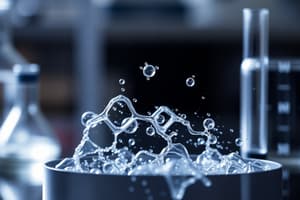Podcast
Questions and Answers
What occurs when the temperature of the solvent reaches a constant value during boiling?
What occurs when the temperature of the solvent reaches a constant value during boiling?
- The boiling point elevation is calculated.
- The volume of the solution becomes constant.
- The solute begins to dissolve.
- Excess vapor passes into the condenser. (correct)
What does the Beckmann thermometer measure in the boiling point elevation experiment?
What does the Beckmann thermometer measure in the boiling point elevation experiment?
- The temperature change of the solution. (correct)
- The density of the solvent.
- The mass of the solute added.
- The elevation of vapor pressure.
How is the boiling point elevation determined in the described methods?
How is the boiling point elevation determined in the described methods?
- By observing the temperature difference before and after adding the solute. (correct)
- By calculating the density of the liquid.
- By measuring the volume of vapor produced.
- By subtracting the boiling point of the solute from that of the solvent.
What apparatus is central to Cottrell's method for determining boiling point elevation?
What apparatus is central to Cottrell's method for determining boiling point elevation?
Why is the boiling point of a solution higher than that of a pure solvent?
Why is the boiling point of a solution higher than that of a pure solvent?
What happens to excess vapor during the cooling process in boiling point elevation experiments?
What happens to excess vapor during the cooling process in boiling point elevation experiments?
What is one feature of the Beckmann thermometer beneficial for the experiments described?
What is one feature of the Beckmann thermometer beneficial for the experiments described?
What is assumed about the volume of the solute in the boiling point elevation experiment?
What is assumed about the volume of the solute in the boiling point elevation experiment?
What defines a phase in a system according to Gibbs?
What defines a phase in a system according to Gibbs?
In a system of totally miscible liquids, how many phases are present?
In a system of totally miscible liquids, how many phases are present?
What is the relationship defined by Gibbs among phases, components, and degrees of freedom?
What is the relationship defined by Gibbs among phases, components, and degrees of freedom?
Which of the following describes a crystal in terms of phases?
Which of the following describes a crystal in terms of phases?
What is an example of a single phase system?
What is an example of a single phase system?
How many phases are present in a system with two immiscible liquids?
How many phases are present in a system with two immiscible liquids?
What does the term 'degrees of freedom' refer to in a system?
What does the term 'degrees of freedom' refer to in a system?
What is the significance of knowing the phase rule in chemistry?
What is the significance of knowing the phase rule in chemistry?
What does Raoult's law state regarding the vapour pressure of a solvent in an ideal solution?
What does Raoult's law state regarding the vapour pressure of a solvent in an ideal solution?
Which of the following correctly defines the lowering of vapour pressure when a non-volatile solute is added?
Which of the following correctly defines the lowering of vapour pressure when a non-volatile solute is added?
How is the mole fraction of the solvent denoted in Raoult's law equation?
How is the mole fraction of the solvent denoted in Raoult's law equation?
Which statement is true regarding the effect of adding a non-volatile solute to a solvent?
Which statement is true regarding the effect of adding a non-volatile solute to a solvent?
What are colligative properties primarily dependent on?
What are colligative properties primarily dependent on?
When adding a non-volatile solute to a solvent, which property of the solvent is expected to change?
When adding a non-volatile solute to a solvent, which property of the solvent is expected to change?
In the context of vapour pressure and colligative properties, what happens to the vapour pressure of the solvent?
In the context of vapour pressure and colligative properties, what happens to the vapour pressure of the solvent?
Which equation signifies the relationship between lowering of vapour pressure, the pure solvent's vapour pressure, and the solute's mole fraction?
Which equation signifies the relationship between lowering of vapour pressure, the pure solvent's vapour pressure, and the solute's mole fraction?
What is the primary focus of chemistry as indicated in the introduction?
What is the primary focus of chemistry as indicated in the introduction?
Which unit is likely to be covered in the first module of the course?
Which unit is likely to be covered in the first module of the course?
What topic is addressed in Unit 2 of Module 2?
What topic is addressed in Unit 2 of Module 2?
What was a primary motivation for establishing the SI system of units?
What was a primary motivation for establishing the SI system of units?
What two systems were common before the adoption of the SI system?
What two systems were common before the adoption of the SI system?
In which module would you study the concepts related to phase rule?
In which module would you study the concepts related to phase rule?
Which of the following is NOT a focus of Module 3?
Which of the following is NOT a focus of Module 3?
What event led to the formal establishment of the SI units?
What event led to the formal establishment of the SI units?
Which unit covers the topic of colligative properties?
Which unit covers the topic of colligative properties?
What is one objective of the study of Units and Dimensions in this module?
What is one objective of the study of Units and Dimensions in this module?
What is a characteristic of derived units?
What is a characteristic of derived units?
What is the primary purpose of Module 1?
What is the primary purpose of Module 1?
Which of the following is considered a basic SI unit?
Which of the following is considered a basic SI unit?
What is addressed in Unit 4 of Module 2?
What is addressed in Unit 4 of Module 2?
How does the SI system contribute to scientific communication?
How does the SI system contribute to scientific communication?
Which topic is likely NOT covered in Module 4?
Which topic is likely NOT covered in Module 4?
Which of the following best describes a physical quantity?
Which of the following best describes a physical quantity?
What is the focus of Unit 3 in Module 3?
What is the focus of Unit 3 in Module 3?
Study Notes
Course Overview
- Offered by the National Open University of Nigeria, School of Science and Technology.
- Course Code: CHM 103; Title: Introductory Physical Chemistry I.
- Course development led by Dr. Temi Busari from the University of Lagos.
Course Structure
- Course comprises four modules covering fundamental concepts in physical chemistry.
- Modules include:
- Introduction to units and dimensions, SI prefixes, and separation techniques.
- Properties and behavior of gases, including ideal and real gases.
- Characteristics of solid and liquid states, including bonding and crystal structures.
- Solutions and phase equilibria, exploring colligative properties and the phase rule.
Key Concepts in Physical Chemistry
-
Units and Dimensions:
- Importance of SI units for standardized scientific communication.
- Differentiation between basic and derived SI units.
-
Gaseous State:
- Exploration of gas properties, ideal gas behavior, and deviations in real gases.
- Introduction to the kinetic theory of gases which describes the motion and energy of gas particles.
-
Solid and Liquid States:
- Examination of solid types, bonding in solids, and crystalline structures.
- Analysis of properties of liquids, such as viscosity and surface tension.
Solutions and Colligative Properties
-
Definition of colligative properties: properties depending on the number of solute particles, not their identity.
-
Key colligative properties include:
- Relative lowering of vapor pressure.
- Elevation of boiling point.
- Depression of freezing point.
- Osmotic pressure.
-
Raoult's Law:
- Governs the vapor pressure of a solvent in an ideal solution, relating it to the mole fraction of components.
Phase Equilibria
-
Phase Rule:
- Developed by Gibbs, relates the number of phases, components, and degrees of freedom in a system.
- Understanding of terms: phase (a homogeneous, mechanically separable part of a system), component (independent constituents), degrees of freedom (variables describing the system).
-
Examples of Phases:
- Mixtures of gases or miscible liquids show fewer phases compared to immiscible liquids.
- A single crystal represents a single phase.
Conclusion of Unit Content
- Overview of methods to determine boiling point elevation and lowering vapor pressure.
- Note on upcoming physical chemistry courses focusing on various equilibria and the application of phase rule in gas systems.
This structure paves the way for deeper exploration of physical chemistry principles, setting the foundation for advanced topics within the field.
Studying That Suits You
Use AI to generate personalized quizzes and flashcards to suit your learning preferences.
Related Documents
Description
Test your knowledge on the fundamental concepts of Physical Chemistry with this quiz tailored for CHM 103 at the National Open University of Nigeria. Dive into topics such as thermodynamics, chemical kinetics, and molecular structure as you gauge your understanding of introductory principles.




